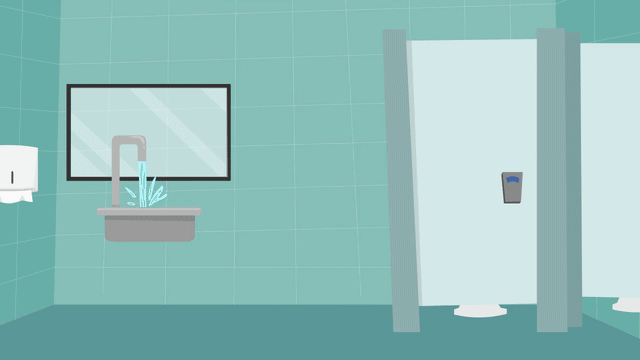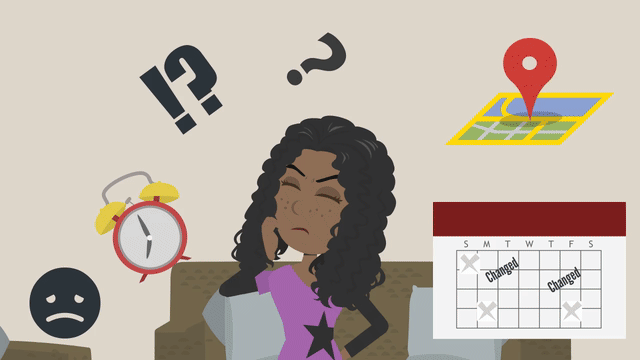Anxiety and Sensory Issues
George has sensory sensitivities and gets easily overwhelmed by sounds and visuals. George also has anxiety and is afraid of public restrooms.

George’s fear of public restrooms is a bit more complicated than his other fears. He is afraid of public restrooms for two reasons:
- Because he worries about all the germs in the restroom, and
- Because he gets extremely overwhelmed by all the loud noises (toilets flushing, automatic hand dries, and sinks running).
If George wants to make a plan of action for his fear of public restrooms, he needs to make sure he addresses his sensory sensitivities too, not just his anxiety about germs.
Is it Anxiety, Autism or Both?
Since autistic people’s brains work differently, it makes sense if you experience the world differently as well. If you are more sensitive to lights, sounds, or textures, it is probably not something you are able to change about yourself. This is because sensory sensitivities are a trait of autism, and it is different from your anxiety. But sometimes, sensory issues can start leading to anxiety. If you become afraid of situations or things because of your sensory triggers, or if you are anxious and on guard all the time about becoming overwhelmed by your senses, then this can be a problem.
In LUNA, we want you to overcome any anxieties that you have developed because of sensory issues. You may want to use flexible tools to help you get through sensory situations and face your anxieties. Our goal is not to get rid of your sensory sensitivity, but to lessen your anxiety about it.
Anxiety and Your Routine
Now, let’s look at Sophia. Sophia feels anxious when there are changes in her life that she does not expect. She doesn’t like any surprises and gets frustrated when her schedule changes. This difficulty with change can be both related to anxiety and autism.

In LUNA, we don’t want you to work on adjusting to changes in your routine and schedule unless it starts causing problems for you. Having a routine and sticking to it can be very helpful, especially for autistic people. It can help you to prepare for the day, stay organized, and manage your day with confidence and assurance.
But if you feel like you must stick to your routine no matter what, and you feel unable to deal with occasional changes, then you may need to address your anxiety about routines. For instance, Sophia is always late to school because it makes her anxious to skip any steps in her morning routine and she cannot hang out with her friends after school because she doesn’t want to have to change her schedule.
Now, let’s think more about how to create or adjust a plan of action for these two fears.
Adapting Your Plan of Action
- Carefully decide what the goal of your plan of action will be.
- Your goal should be what you feel comfortable with and what you would like to achieve in your life. For example, if you are making a plan for anxiety that is related to being sensitive to sound, your goal for the plan of action could be being in loud situations like school assembly or public restrooms (like George) with the help of noise-cancelling headphones.
- Think about tools or supports that you can use to achieve your goal for the plan of action.
- For example, if your plan of action is targeting fears of routine changes, you can discuss with your parent and include things that will help you achieve your goal. It could be something like setting an alarm that lets you know when you need to change to something new, your parent giving you early notice that things will change, or other warnings. Talk with your parent about what will make it easier for you to work on such a plan. It is important to let them know your opinions as they might not be able to know right away.
- Make the exposure activities in your plan of action even more gradual.
- Get creative with the activities in your plan and make them as gradual as possible. This will help you get used to your fear more easily. For example, if you are afraid of fireworks and loud noises, one of your steps could be listening to sounds of fireworks on your phone or watching a video of fireworks instead of waiting for Fourth of July or New Years.
Now, let’s think more about how to create or adjust a plan of action for these two fears.
Adapting Your Plan of Action
- Carefully decide what the goal of your plan of action will be.
- Your goal should be what you feel comfortable with and what you would like to achieve in your life. For example, if you are making a plan for anxiety that is related to being sensitive to sound, your goal for the plan of action could be being in loud situations like school assembly or public restrooms (like George) with the help of noise-cancelling headphones.
- Think about tools or supports that you can use to achieve your goal for the plan of action.
- For example, if your plan of action is targeting fears of routine changes, you can discuss with your parent and include things that will help you achieve your goal. It could be something like setting an alarm that lets you know when you need to change to something new, your parent giving you early notice that things will change, or other warnings. Talk with your parent about what will make it easier for you to work on such a plan. It is important to let them know your opinions as they might not be able to know right away.
- Make the exposure activities in your plan of action even more gradual.
- Get creative with the activities in your plan and make them as gradual as possible. This will help you get used to your fear more easily. For example, if you are afraid of fireworks and loud noises, one of your steps could be listening to sounds of fireworks on your phone or watching a video of fireworks instead of waiting for Fourth of July or New Years.








